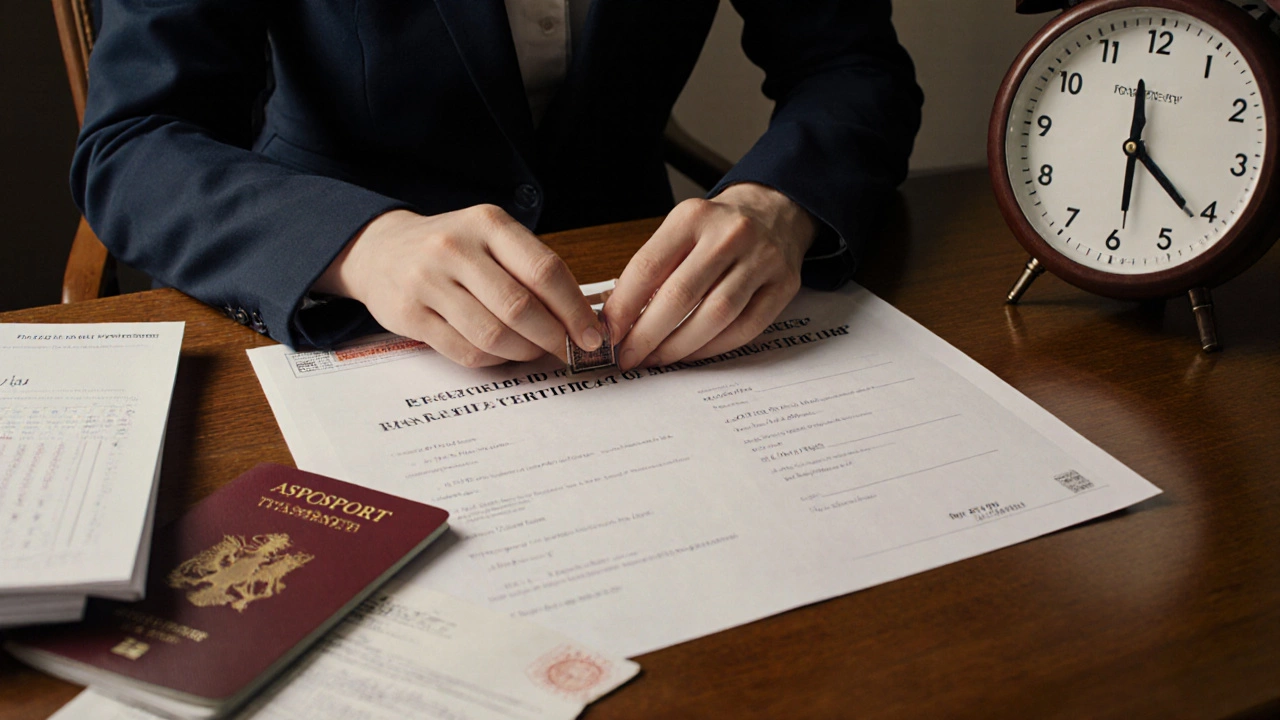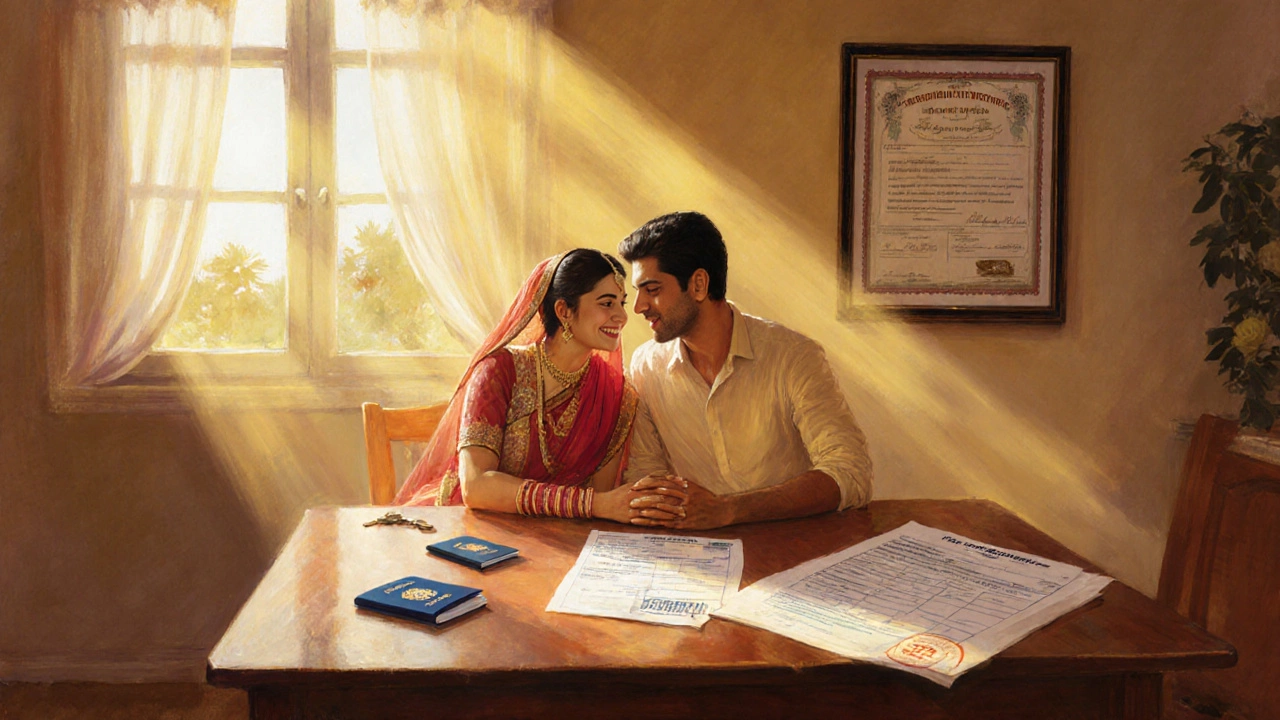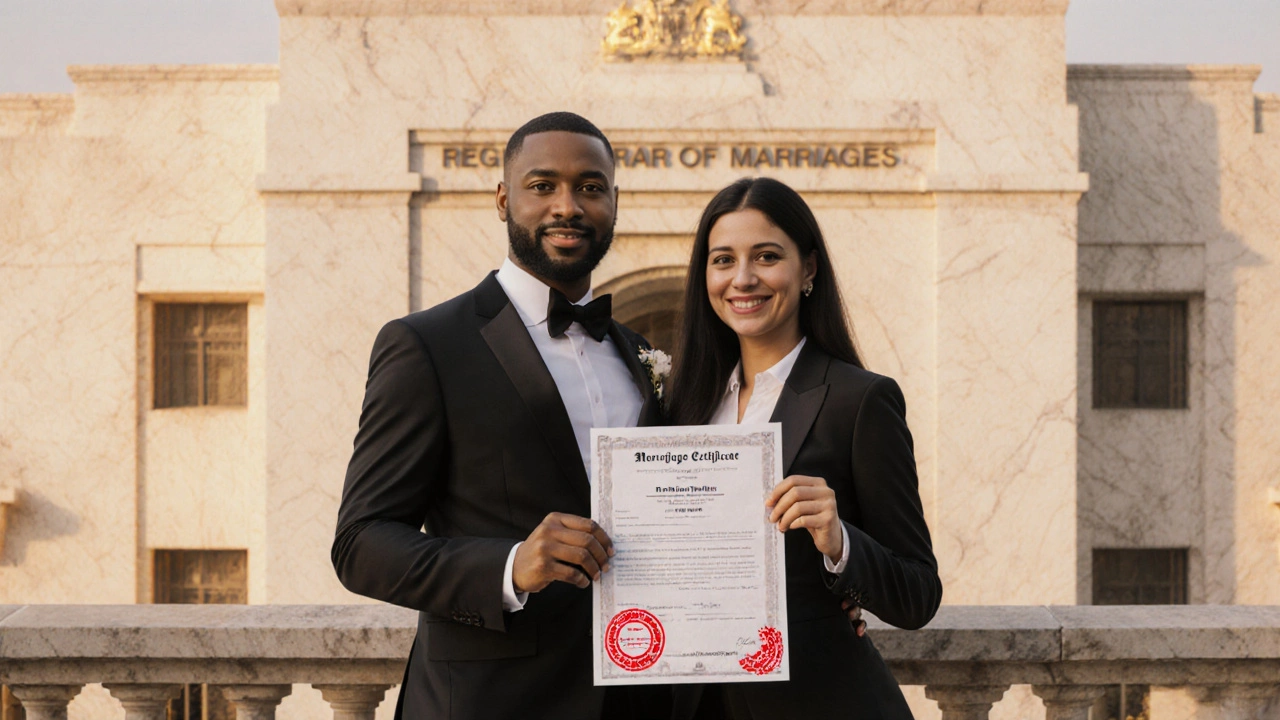Foreign Marriage Certificate Validator
Check Your Foreign Marriage Certificate Status
Enter details about your foreign marriage to see if it's valid in India and what steps are required for registration.
Enter details above and click "Check Validity" to see if your foreign marriage certificate is valid in India and the steps required for registration.
Steps Required for Registration:
1. Authentication
Obtain apostille (Hague) or consular legalization from the issuing country.
2. Translation
Get certified English translation from an accredited translator.
3. Submission
Submit documents to the Registrar of Marriages under Special Marriage Act.
4. Fee Payment
Pay INR 2,000–5,000 depending on state.
Key Takeaways
- A foreign marriage certificate is not automatically valid in India; it must be registered with the appropriate Indian authority.
- The process involves authentication (apostille or consular legalization), translation, and submission to the Registrar of Marriages.
- Only marriages performed under the Special Marriage Act, 1954 (or the Hindu Marriage Act for Hindus) are eligible for registration.
- Fees range from INR 2,000 to 5,000, and the whole procedure typically takes 4‑8 weeks.
- Failure to register can affect inheritance, taxation, and visa applications.
When you bring a foreign marriage certificate a legal document issued by a country outside India that proves a marriage has taken place back to India, many people wonder whether it works the same as a locally issued certificate. The short answer is: foreign marriage certificate India is not automatically recognized. It becomes valid only after you follow a set of authentication and registration steps prescribed by Indian law.
Understanding the Legal Framework
India’s marriage laws are split into two main regimes:
- The Indian Marriage Act refers to the Special Marriage Act, 1954, which governs civil marriages irrespective of religion.
- The personal‑law statutes (Hindu Marriage Act, Muslim Personal Law, etc.) that apply when couples marry under their respective faiths.
If your overseas ceremony was a civil union (for example, under a U.K. civil partnership or a U.S. “marriage” license), you will need to register it under the Special Marriage Act. Religious ceremonies performed abroad can also be registered, but only if the religion is recognized in India and the marriage complies with that personal law.

Step‑by‑Step: How to Make Your Foreign Certificate Valid
- Obtain an apostille or consular legalization. The first hurdle is proving that the foreign document is genuine. For countries that are parties to the Hague Apostille Convention, you need an apostille a certificate issued by the designated authority of the country that authenticates the document for international use. If the country is not a signatory, you must go through the consulate the diplomatic office of the foreign country in India that can legalise documents or its embassy.
- Get the document translated. The Ministry of External Affairs (MEA) requires a certified English translation if the original certificate is in another language. The translator must be accredited, and the translation itself often needs to be notarised by a notary public a legally authorized official who certifies the authenticity of signatures and documents.
- Submit to the Registrar of Marriages. Locate the office of the Registrar of Marriages the government official responsible for recording marriages under the Special Marriage Act in the district where you reside. You’ll fill out Form SM‑1, attach the apostilled/legally‑certified certificate, the translation, passport copies, and proof of residence (e.g., electricity bill).
- Pay the prescribed fee. The cost varies by state but typically falls between INR2,000 and5,000. Some states also charge an additional fee for the issuance of a certified copy of the Indian marriage certificate.
- Wait for verification and issuance. The registrar has 30 days to verify the documents. If everything checks out, you’ll receive an Indian marriage certificate, which is now legally recognized for all purposes - inheritance, tax filings, passport applications, etc.
Common Pitfalls and How to Avoid Them
- Skipping the apostille. Even if your spouse’s country is a signatory to the Hague Convention, the apostille must be affixed to the original certificate, not a photocopy.
- Using an unofficial translator. A translation from an unaccredited source will be rejected, causing delays.
- Submitting to the wrong authority. Only the Registrar of Marriages under the Special Marriage Act can register a foreign civil marriage; municipal offices dealing with local Hindu marriages cannot.
- Ignoring the time limit. If you wait more than three years after the overseas ceremony to register, the registrar may ask for additional evidence like joint bank statements or photographs.
Special Scenarios
There are a few edge cases where the procedure changes:
| Scenario | Legal Basis | Key Steps |
|---|---|---|
| Couple married under the Special Marriage Act abroad | Special Marriage Act, 1954 | Apostille → Translation → Registrar submission |
| Hindu ceremony performed in Nepal | Hindu Marriage Act, 1955 | Consular legalization → Translation → Registrar (Hindu) submission |
| Muslim Nikah performed in the UAE | Muslim Personal Law (Shariat) Application Act, 1937 | Legalisation at UAE Embassy → Certified translation → Submission to local magistrate |
If you fall into any of these categories, the core steps stay the same-authentication, translation, registrar filing-but the governing law changes, which can affect required documents and processing time.

Why Registration Matters
Beyond the legal neatness, an Indian‑registered marriage impacts:
- Inheritance rights. Without a recognized certificate, you may face challenges claiming property under the Indian Succession Act.
- Visa and immigration. Spousal visas for foreign partners require proof of a legally valid marriage.
- Tax benefits. Joint filing and deductions for dependents need a certified marriage record.
- Social security and pensions. Government schemes often verify marital status through official certificates.
Quick Checklist Before You Begin
- Verify that the foreign marriage was conducted under a civil or recognized religious law.
- Secure an apostille (or consular legalization) from the country where you married.
- Obtain a certified English translation from an accredited translator.
- Gather passport copies, proof of residence, and any previous Indian ID documents.
- Book an appointment with the nearest Registrar of Marriages under the Special Marriage Act.
- Pay the fee and retain the receipt for future reference.
Frequently Asked Questions
Can I use a foreign marriage certificate for a passport application?
Only after the certificate has been registered with the Indian Registrar of Marriages. The Indian passport office accepts the locally issued certificate, not the foreign one.
Do I need an apostille if the marriage took place in the United States?
Yes. The U.S. is a signatory to the Hague Convention, so an apostille from the state’s Secretary of State is required before you can submit the document in India.
What if my spouse is a citizen of a non‑Hague country?
You’ll need to go through consular legalization at the foreign country’s embassy or consulate in India, followed by translation and notarisation.
Is there a time limit for registering a foreign marriage?
While there is no strict statutory deadline, waiting more than three years may trigger additional proof requirements, and some states impose a five‑year limit for convenience.
Do I need to register the marriage in every state I move to?
No. Once the marriage is registered under the Special Marriage Act, it is recognized nationwide. You only need to update your address with the local registrar if you relocate.
